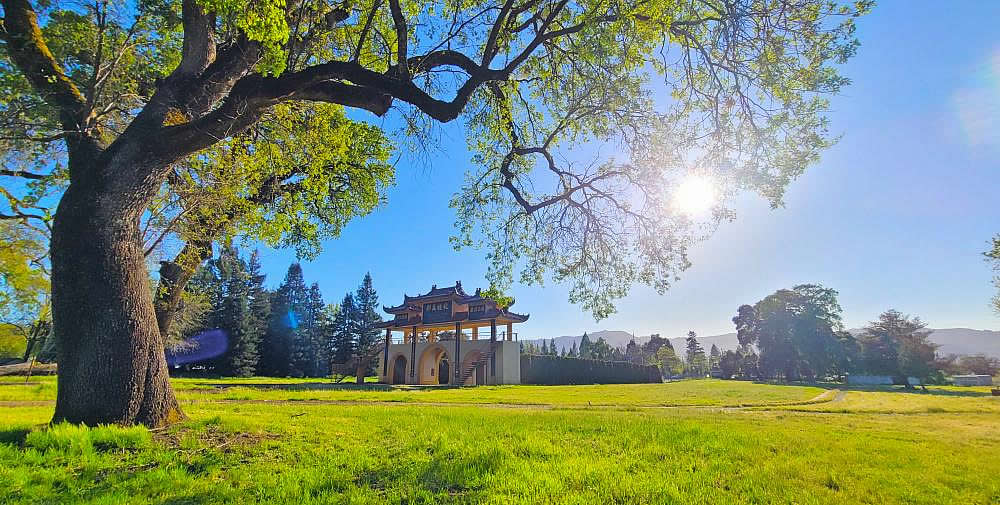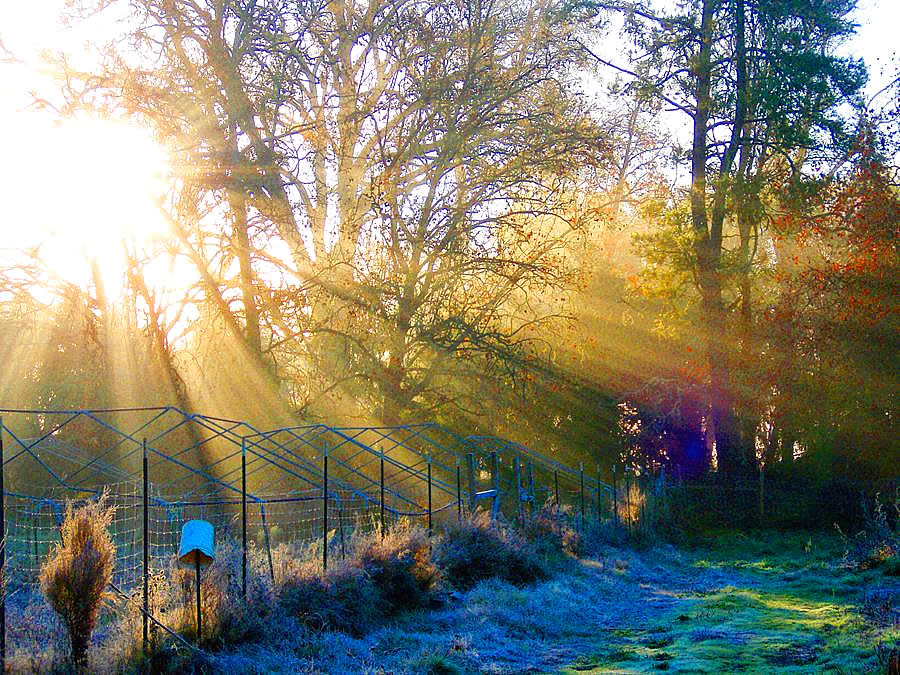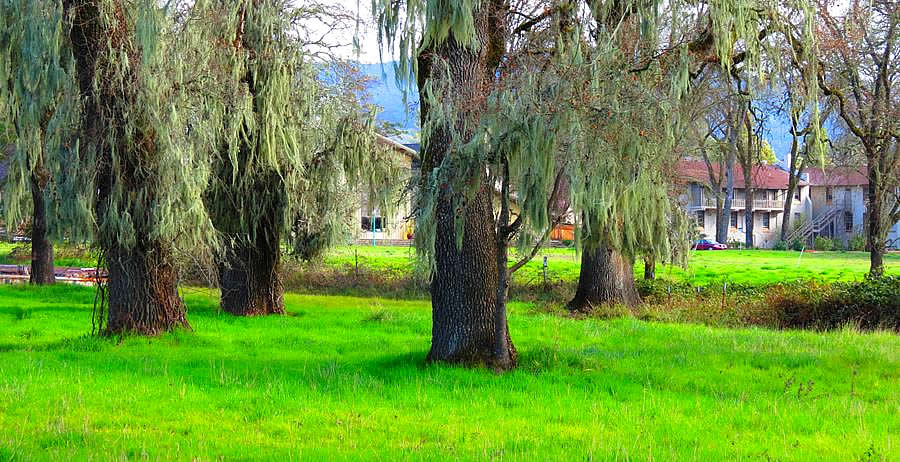 |
|
Gratitude and Cultivation

A Talk given by Victoria Pang, February 15, 2025
Homage to all Buddhas and Bodhisattvas, Venerable Master Hsüan Hua, Dharma Masters, and Buddhist friends. Amitabha! My name is Victoria. I am a DRBU (Dharma Realm Buddhist University) Master’s student, and I will be graduating in about 3 months. Before I begin sharing what little I have truly cultivated, and which I’ve only heard about from the sages, I will share with you a bit about my life before DRBU.
My mom carried me for over nine months and birthed me by C-section. At night, when I cried, she chanted the Great Compassion mantra until I quieted down. She taught me my first Chinese words, read “Yuefei Dedicates His Life to Repay His Country” for my bedtime story, bought me CDs teaching me Chinese proverbs, like the fish’s eye is mixed with a pearl, one covers one’s ear to steal the bell and bought me simplified English and Chinese classics like Jane Eyre and Great Expectations. Her favorite line from the Diamond Sutra is “all dharmas exist like dreams, illusions, bubbles, and shadows,” and her idol is Earth Store Bodhisattva. She wanted me to know the roots of my ancestors and walk the paths of the sages. She told me, “One kind thought can change your life,” and proved it through her life’s actions. She said she could die for Buddhism 10,000 times and over. She gave me three little siblings whom I love more than they would ever know. From my mother, too, my love for China, Chinese culture, Buddhism, and helping the world was born.
Compared to hers, my life feels insignificant. The month before I turned 23, I wrote in my diary: “Is it enough to be grateful? I have lived 23 years, yet all I recall is the kindness of angels who appeared in my life. As of today, I have accomplished nothing. Is gratitude simply enough?” Dufu said in a poem, “I wish to create a building that would cover all red-cheeked scholars from the cold.” Little can we imagine, he was sleeping under frozen and torn blankets, and his thatched roof had just been blown off and then stolen by a bunch of urchins from a southern village. The country was mired in war, yet this was his powerful vow. In my late teen years, I thought I would go out and save the world. But in reality, there was much more I had to cultivate and learn. My dream then was to spread Chinese culture to the West. I took many classes and joined many clubs, and concluded that politics was the answer, but when I entered the field working for two political and civic engagement centers, I quickly realized that the world had lost sight of something important: the ability to reflect and repent. The connection we had to our virtuous hearts was too shallow, and my single voice and the voices of our fellow politicians were too meek to make so much as a ripple in the ocean of people struggling to find meaning in the grand race of greed and survival.
Rumi said, “Dust settles upon my head and upon my metaphors, for You (the Divine) are beyond anything we can ever think or say.” That’s how I feel when I am in Amitabha’s midst; he is not just immeasurably great in his vows, the power of which has transformed his land into golden light, golden trees, golden birds, and indeed, golden souls; compared to him, I am nothing, deserving of nothing, amounting to nothing. The only thing I have is this breath, this vow, and it comes not from the grotesque desires of the heart nor the shallow judgments of the world I grasp onto—dharmas, as we call them in Abhidharma class—but from a deeper place in my heart.
Does this mean that I have no more thoughts? Not necessarily, or else I wouldn’t have enrolled in the Master’s program at DRBU in the summer of 2023. We do a lot of thinking and talking in class, and sometimes I feel that I wish I could do something about all our suffering, and I grow impatient. Yet, there is merit in our thoughts because they permeate our consciousness with images, traits, and values of the Buddhas, the Bodhisattvas, the devas, Dharma protectors, and sages.
I remember a line from the Lotus sutra we recently read for class: “We shall endure all these difficulties. Not cherishing the body or life itself, But caring only for the supreme path.” The supreme path is the One Buddha Vehicle in the Lotus Sutra, which does not discriminate between sects in Buddhism, but lights up different dharmas that interweave to a perfect actualization of our original luminous natures; the One Great Matter, according to this same sutra is, and I quote: “the wish to lead living beings to open the knowledge and vision of the Buddhas and gain purity.”
For this purpose, there is no service you would not render (from the Avatamsaka Sutra), and I know that is what I must cultivate. When I finally began studying the Lotus Sutra in my last semester at DRBU, I felt almost like the world had been born anew, all I knew before had collapsed, and new hope rose like a giant sun in the sky—my heart’s horizon.

This is what I must cultivate. But how would I do that? When I close my eyes and think of CTTB, I first think of the bhikkhus, bhikkhunis, and Dharma masters. You are all my inspiration. Although we may not know each other, yet, how your selflessness has changed me and my entire outlook on life! How tireless, how humble, how kind, how hardworking you are; there is not an ounce of difference I see in your actions and the Bodhisattvas. I’ve reflected since: the paramitas of patience, vigor, wisdom, concentration, virtue, and generosity are the first steps.A Dharma Master said to us in our class last year: our karma is like snowflakes; beautiful, yet cold; striking, yet impermanent; we need only to let it pass through on its own course. When life gets tough, resilience is what we cultivate. And only when we have enough resilience can we be there for others during times of weakness, for suffering is the condition of this life. We must not forget.
Reading the Avatamsaka Sutra, my classmates and I lamented how the vows and achievements of the Bodhisattvas seemed impossible, yet, my professor told us they served as our ideals. Indeed, the moment this thought entered my mind, I would feel strength on days that I worried about the many things happening in my life, from my past mistakes to the color of my shirt to the quality of a big project that I was working on.
When I had such negative thoughts, I think of Fanzhongyan’s quote about the sages: “They did not delight in material gains, nor grow melancholic at their own conditions; while in the halls of the high court, they worried about the people; while dwelling faraway by the river banks and lakesides, they worried for their ruler. They worried when making progress at home and worried in retreats far away. Then when were they happy? It must be said thus: "Be the first to worry about the world and the last to enjoy the taste of happiness.”
That’s why the Bodhisattvas will spend lifetimes doing what they do; that’s why the City of Ten Thousand Buddhas (CTTB) exists; we must respect the Bodhisattvas, we must respect Venerable Master; to venerate the master is to venerate the vows of all the sages and bodhisattvas past; someone reminded me recently: through Venerable Master, we have come to know about the Buddhas, face our defilements, and cultivate our virtue; a classmate told me, on top of recalling the Buddhas’ images, mantra chanting helps us embody and contemplate the traits the Buddhas, Bodhisattvas, deities, and sages have perfected in their past lives, and which lay just within us too. It was during my third semester Shurangama Sutra class (last semester) that this truth changed my life. Mantra chanting was not a foreign activity to me, as I was used to meditating and chanting since I was a child. But, during my third semester at DRBU, my cultivation and studies had reached stagnation. More ideas, quotes, and wholesome memories were flooding my mind, but my karmic habits were also increasing at the same, if not at faster rates.
At age 22, dismayed by what I found in my time working, I found comfort in putting the blame on others for our precarious world situation: wars abroad, deteriorating public education, gun violence out of control, slandering of religion and faith, misconduct in every corner of the world…In the short span of 4 years since reading my idealistic poetry in college, my morale and hope had collapsed and nearly extinguished itself—I was so weak, yet the world is too broken for me to be weak.
I want to tell everyone here that from my personal experience and reflections only, I believe many people in the world have good hearts, but they do not know the laws of karma. They do not contemplate their minds apart from attachments, and it is precisely these attachments that bind us to samsara, according to the twelve links of dependent arising. The practices of the secular realm—our tasks, duties, jobs, and reality and the cultivation of otherworldly dharmas—ceremonies, repentance, meditation, mantra recitation, watching our thoughts—go hand in hand. Worldly dharmas help us perfect otherworldly dharmas, while worldly dharmas were named due to the existence of sentient beings and suffering.
We may have once been government officials or teachers and laborers in our past lives since beginningless time. Knowing the karmic ties we may all secretly share with each other, the Exhortations of the Vow on Bodhi told us to be grateful for our parents, our karmic benefactors, and to be compassionate to all the suffering beings in the dharma realms. Gratitude was also a major and central theme of my class. Thus, I reflect: my father and mother gave me life and shaped it to be, fortunately, on the path of the dharma; my will is at the commands of my parents, and of the Buddha; to truly honor your parents is to be like Venerable Master Hsüan Hua—by completing our dharmic and civic duties out of filial piety. According to the chapter on the fourth ground Bodhisattva, we should always “repay kindness”. Gratitude is what I feel at every turn and every moment for this city; although I haven’t begun to repay the kindness dealt to me, I will always remember:
The autumn leaves, which were so bright, like little flags of love and happiness strewn across the floor; the bright, almost translucent green of the grass in spring; the fragrance of the daffodils in full bloom; one handed to me in a simple and innocent gesture of a student at recess; the purple and pink blossoms nestled vulnerably in the open air; the child in me which soared with joy as I trampled along the stream and into the forest; the quiet awe as I walked daintily along the grassy lawns which were so tranquil on their own; the mysterious, sometimes sorrowful, sometimes demanding calls of the peacocks during Professor Doug’s lectures on Yongjia’s awakening; I thought somewhere, sometime, have I been here before, a long time ago?

I remember chopping mushrooms in the morning during a Guanyin Session with the nuns, and I’ll never forget the feeling of realizing the labor and heart which my feet trod upon every day on this piece of land. I recall my professors sending caring emails when I didn’t feel well, and I thought to myself, after one particularly touching one, Dharma masters can also use emojis! Little could I have imagined that beneath the earth-toned tiles of these gates and buildings lies such a pulsing heart of care.I am grateful to my classmates at DRBU for their depth, their compassion, their curiosity, their effort, their seriousness in cultivation, and their humorous take on life. How I’m grateful for my students’ crisp laughter in the midday sunshine, their struggles, their tears, their strength, their smiling faces in the Lunar New Year festival; their sweet interactions with each other; when they call my name, I learn to love better. My 12-year-old student reminded me: You mustn’t look at anything through only one lens. Like a paper has two sides, there are always two sides to any situation, a positive and a negative. Life is just about experience. Humbled, I asked myself, who really is the teacher here? My students are my little Bodhisattvas.
I remember clearly that last semester was my angriest semester. Perhaps my year-long honeymoon phase at DRBU was over, and I was realizing that I was still in samsara, just in a better corner of it, or perhaps an extra set of karma had just ruptured in my face and caught me by surprise, or maybe, as some say, the harder you cultivate, the harder it gets. Were the demons coming for me? Or was I just ignorant and foolish, or both?
I picked up a book, the Basic Conducts of Laity, based on Venerable Hsüan Hua’s teachings, and read the reflection we should have toward all living beings: “I dare not slight you because you will become a Buddha in the future.” I felt my anger dispel. All the long-gone lessons of kindness I read when I was 18 flooded back to me: Shantideva’s teachings on forbearance of our karmic creditors, Bodhidharma's exhortations on the endurance of suffering as the practice of true Bodhi…Curious, I searched up the benefits of morning ceremony—that faraway feat that seemed truly beyond my wildest imaginations. The CTTB website read: “In the early morning, when the myriad states have not arisen, when our minds are quiet and tranquil, we should awaken and get dressed and immediately commence the recitation of the Shurangama Mantra of the Buddha’s Summit. This mantra serves to regulate the five desires before they have had time to arise so that our minds quickly penetrate and directly reveal the wonderful nature of the Treasury of the Thus Come One as it truly is. As it is said, “Still and unmoving, there is a response and a spontaneous penetration." On my 11th day in a row of going, I could feel my mind so clearly for the first time, the activities of each thought, the shadows they cast on my daily life. It was my own greed, hatred, and desire that had caused everything to happen the way it did. What little virtuous thoughts I had would always be engulfed by my attachment to the self. The Diamond Sutra says: “Subhuti, if a Bodhisattva has a mark of self, a mark of others, a mark of living beings, or a mark of a life, he is not a Bodhisattva.” Why is this? Because when you have attachments, you will always fall into delusion, anger, and greed; sentient beings will only be viewed through your own habitual karmic thoughts, and thus, new karma will always be generated.
But who doesn’t have ignorance, greed, and hatred? But not everyone has a sacred site like ours to cultivate the proper Dharma on. We desperately need this campus; the world desperately needs us. So I sincerely thank each and every single one of the cultivators who have stepped onto this land for creating and sustaining this kingdom in which we can cultivate. Our merits, blessings, and virtues are insufficient, but I believe every one of us came here for a reason and that somewhere deep in our hearts also lies a vow. My gratitude knows no bounds, and I only pray that we will all attain fruition in our cultivation.